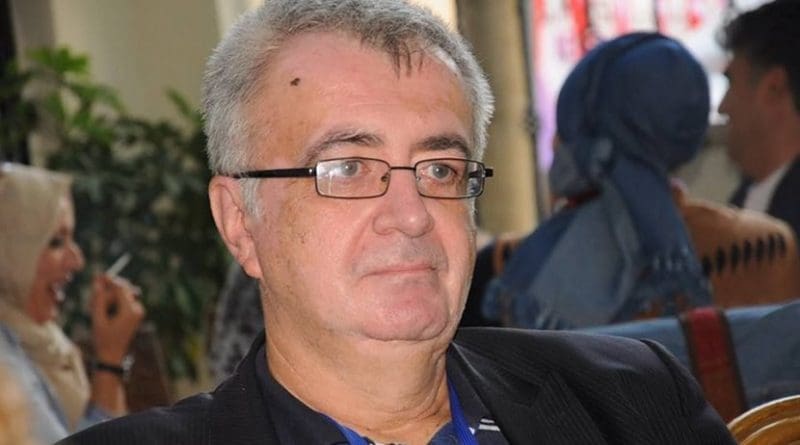Sabahudin Hadzialic: A Self-Sustained Writer At The Heart Of The Balkans – Interview
By Peter Tase
In early January, 2014, I had a memorable conversation with Sabahudin Hadzialic, a distinguished writer from Bosnia and Herzegovina, and the editor in Chief, of ”Diogen“ pro culture, a published magazine in the city of Sarajevo, Bosna – Herzegovina, and registered in Kusbacht (Switzerland). The following is a summary of Mr. Hadzialic’s thoughts on literature, the ethnical divide and understanding, Culture and Poetry and Global initiatives.
Peter Tase: What are some of the challenges faced by the Literature of Bosnia Herzegovina today?
Sabahudin Hadzialic: I would like to point out some thoughts on prose and poetry in general, which are not within difference neither for Bosnia and Herzegovina, neither for any other country in the region. It is not difficult to write. It is difficult to know how to write….and Everybody can write a poetry but only few can write a poem. In Bosnia and Herzegovina, in addition to the above mentioned challenges you have other human obstacles. In order to be a well versed writer, or poet, you may not be a national artist. A writer must be the artist of the nations.
Social influence produces multiple reflections within an engaging art of writing, and for me writing is the art of the soul expressed by writing. Especially products of writing multiple reflections within a deeply divided society such as Bosnia and Herzegovina is to have a visible capacity to identify ethnicity, environment and obedience.
On the other side of “the bridge’ there is completely other extreme of exclusiveness, anarchism and disrespect (all what has been told on the “left bank of the river” for me on the “right bank of the river” is excluded as nonsense sublimaris ) everything that comes from the other side.
But on the bridge is something that can really be a true engaging art of writing with the same deflection from the left and right options. You could call it a civil recognizing of the critical observation of reality. The creation of rationale of other possible modalities can be found in finding a formula that not exclude, even for a moment, quality at the expense of quantity, and not vice versa either. How to shape the above mentioned elements?
1. By not excluding reflection of the foundation of roots, and including a fingerprint of direct communication.
2. Applying transparency of your own mission while encountering the face of a naked biography of reality.
3. Refraining from nepotism, national and gender exclusivity.
4. Emphasizing your own flaws as assumptions for the possible solutions – while improving our own beings as we are making substantial contributions to society.
5. By using a non-hatred language as a basic assumption for the initial understanding and in a later phase even though there is proximity of original intentions.
6.Understanding that in the long run the common good/benefit wins while individual good/benefit has a short duration.
7.Through the open form of communication with a clear assumption of doing/committing is aimed towards the ultimate truth – citizens are humans on the first place, and after that Bosniaks (Muslims), Serbs and/or Croats.
To conclude, what about the future of literature? Only through enhancing knowledge. Using one’s knowledge that is based on using facts and not that kind of knowledge that is based on myths. In order to better illustrate I would like to use an aphorism of mine, ”Why are we having wars here? Aren’t we just three tribes of the same people?”
PT: Is the community of writers in BH well organized, what are some of the influential works published recently in Sarajevo?
SH.: The community of writers reflects also an ethnic division of the country, which as I mentioned, has certain exceptions. Especially in Sarajevo, Association of writers of Bosnia and Herzegovina (with a majority of Bosnian Muslim) who has a multi-ethnic constitution (even some of the recent Presidents were not Bosnian-Muslims), but still far away, as well as the society in general, from being a truly multi-ethnic within its core. But, the community of writers reflects also ethnic division of the country, with, as I mentioned, certain exception. Especially in Sarajevo, Association of writers of Bosnia and Herzegovina (majority of Bosniak Muslim) who has multi-ethnic constitution (even some of the recent Presidents were not Bosniak-Muslims), but still far away, as well as the society in general, from being really multi-ethnic within its core. But, I have to underline, more multi-ethnic than mentioned from Banja Luka (majority of Serbs) and/or Mostar (majority of Croats).
I have the status of a Distinguished self-sustained writer in Canton Sarajevo among other 15 colleagues of mine, members of the Association of Writers of Bosnia and Herzegovina. My appreciation goes to all of them who have distinguished myself as an artist and writer. Cantonal government covers our health and retirement costs. Among the fifteen of us there are writers from all ethnicities of Bosnia and Herzegovina and it shows that this Association is well organized within this part of work. The solution is to have more interaction, connection, exchange of writers, not just the selected ones, but all of the members of the above mentioned associations.
Only through a constant interaction and global engagement we can find possible solutions and ‘the formula” to secure co-existence, mutual respect and inter-ethnic understanding and friendship.

